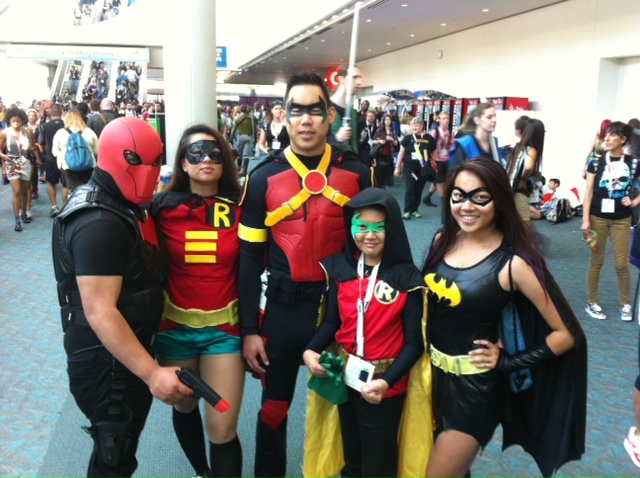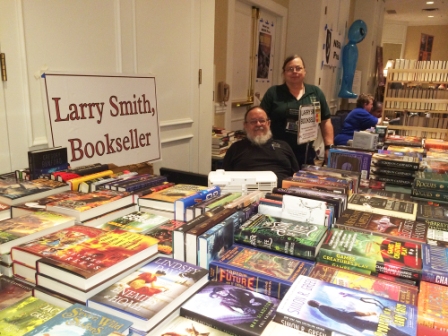
Batgroup Ben, Alex, Q, Josh and Vivian at SDCC.
By James Bacon: It was a warm sunny Sunday in Burlington, Massachusetts, and people were relaxed, sitting and chatting outside the Marriott Hotel where Readercon was being held. I walked into the relative calmness of Readercon, a quietness that belies the intensity of some conversations and earnestness with which people were going about the convention. It was a very different energy, yet not at all dissimilar from San Diego Comic-Con (SDCC) in southern California, where I had attended the day before.
Of course, it was the last day of Readercon, and I had red-eyed to Boston from San Diego, the comparison of experience was inevitable, yet it was the commonalities between the two conventions that made me smile. I soon found a free book room and was pleased to pick up some ‘zines from the Richard III Society, dating back to the 1980s. I also picked up a New Worlds from the 1950s and a couple of other pulp digest mags based on promises of excitement on the covers. One of my fellow free book browsers found one a couple of Galaxy Magazines self identifying as “pertinent science fiction” and there was much laughter. The Readercon freebie room was so much calmer than the free table in the Marvel booth, which can only be likened to a Rugby match, or the huge queues for free items at SDCC.
 In the Dealers Room at Readercon, Michael Walsh and Bill Campbell proved as eloquent in greeting and conversation as they were as book sellers, and I was pleased to hear that Bill’s press had their new Samuel R. Delany inspired anthology Stories for Chip for sale and it was selling well.
In the Dealers Room at Readercon, Michael Walsh and Bill Campbell proved as eloquent in greeting and conversation as they were as book sellers, and I was pleased to hear that Bill’s press had their new Samuel R. Delany inspired anthology Stories for Chip for sale and it was selling well.

Beer and a book on the bar at Readercon.
Just like San Diego, I found any intention of getting into programme soon waylaid and was side tracked into lively chats with Liza Trombi and then Erin Underwood in the bar, which was nice. Chat seemed to be continuous as I wandered around the Dealers Room and common areas in the Marriott, which were spacious and easy to get around.
I got engaged in a conversation with a fan about current affairs in the SF community. This fan had lost family during the Second World War, in Europe, and as the conversation roamed, opinions and thoughts were exchanged. This was a fabulous conversation, not because there was a meeting of minds, but rather that there was disagreement. However, that disagreement was so polite, and also so recognisably not by many degrees, that we respected one another’s opinion. This is important since there is an adage that those who are of a similar but slightly differing opinions will argue the most, but today I think it is important to recognise allies for decency, rather than wining my exact viewpoint to the point.
I was pleased to see Dave Kyle at Readercon, one of those ever rarer members of First Fandom, and was glad to find him in good spirits. We have met now many times, and I enjoy chatting with him and relished the opportunity to introduce him to Bill as a member of the first Worldcon in 1939. His daughter, Kerry Kyle talked about how there was a schism even then, and it made me smile. Ah, fans! Dave heads off on his moby, skilfully negotiating his way around the Dealers Room at a decent speed.

James Bacon, Bill Campbell and Dave Kyle at Readercon.

Dave Kyle and James Bacon at Readercon.
At San Diego Comic-Con, I saw a lot of people in Moby’s, and the area for disabled people and short separate queues seemed like it was all very positive despite reading that it was not perfect. That indeed would be true, no convention is perfect, but while I can pause and wander around a group of people, I can imagine the choke points in SDCC were both frustrating and upsetting for the less mobile. In contrast, here at Readercon, I see there is a lot of care and attention for anyone who is disabled as I feel is only correct.
There is no doubt the Worldcon bid for 2017 has created interest. At Readercon, I saw Crystal Huff who seemed pleased with Helsinki’s work, and indeed there were no shortage of Helsinki T-shirts to be seen. Ben Yallow was chatting enthusiastically with Bill Campbell, who lives in Washington, about the DC bid. It is all go this year, and even in San Diego there were quite a few people interested for various reasons in the race between Montreal, Japan, DC and Helsinki. In San Diego, I had met Mike Wilmoth, a senior programme ops manager for SDCC, who also happens to be a deputy chair for Sasquan. He had been at Westercon the weekend before where there had been a fannish inquisition. Mike was not the only deputy chair I met in San Diego as Laura Domitz was helping in the art show. I was amazed at how many people from the Worldcon side of fandom were present at SDCC, as I kept bumping into fans as well as volunteers.
A question that came up at Westercon, which I had heard about before SDCC was along the lines of “what is one going to do to increase diversity at conventions?” and for some reason this question entered my consciousness as one to consider hard, especially given my coast-to-coast convention experiences over the weekend. Asking those who I want to welcome was an initial thought and I was conscious to consider this question broadly, mindful that thoughts must be turned into successful actions.
I can only tell you what I observe, I cannot and do not have facts or figures, or even evidence of an empirical nature, just what I saw as I wandered about both conventions. Yet it is interesting that San Diego Comic-Con felt very diverse. Of course, Readercon works hard, I feel, to be welcoming in their own way, which is borne out in their programme participant statement: “Readercon is committed to diversity in its program; we believe a wide range of voices makes for better conversation. We strongly encourage members of minority and underprivileged groups to apply.” This is very good, and I feel that leadership can be shown by conventions in working at having diverse panels and programme, which in turn attracts diverse members.
I noted after the con, that Readercon had great levels of diversity on panels, which compared to SDCC was a trump.
During a trip to Baltimore Comic Con a couple of years ago, I felt that convention was more diverse in attendance than any other con I have attended. By observation it was incredible, and I pondered that now, and wondered if it was about the cost, location, or programme participants in Baltimore.
If cost and affordability had an impact, was this why San Diego Comic-Con had a lot of diversity? A day ticket for SDCC was $50 for an adult and children 12 or under get in free with a paying adult. That is if you were lucky enough to get a ticket, of course. There is also a Junior price of $25 for 13 to 17-year-olds. Baltimore Comic Con is $30 for a Saturday, and kids under ten go in free with an adult while a day ticket on Saturday for Readercon was $55 and indeed cheaper than both on Sunday at only $25 and children under 15 attend free with an adult too.

Avelaka as Marvel Girl.

Bat Family, Michael, Samantha and David at SDCC.

Ginger as a Clone Trooper at SDCC.
I do not know if that is often talked about in the States, but at most of the UK and Irish conventions I have worked on, there have also been discounted rates for those who are on employment benefit, Job Seekers Allowance, or on the dole. Terms change but basically out of work admission has ranged from 25-50% off the ticket price. Students likewise have gotten discounts, or sometimes it is young people up to 26 years of age and so on. It may be just another difference that in the States student and child prices are lower (or free) while discounts for unemployed fans are just not contemplated as being enabling, but I always approve of them. Indeed, I have had no issue about the disparity in what I pay if it enables someone in an unfortunate situation to come along.
So, I wondered about that. I noted that Readercon had signed up for Con or Bust, so there were three free memberships available to those in need, but I was not sure what SDCC or Baltimore had done in this regard. So, in many ways, that was even more progressive than my leftist European ways of discounts. Although many cons now on both sides of the Atlantic are also singing up, which is fabulous.
I also wondered if location may have been a factor. SDCC is down town in the Gas Lamp District with trolley access. Likewise, the convention is down-town for Baltimore Comic Con, and although Readercon was in Burlington, which is about 35 minutes by Bus (352) from Downtown Boston, a 14 mile drive, and there is also a route using the ‘T’ redline and 350 bus. So, despite not being downtown, it is accessible by decent public transport, which I think is pretty good going. I would be curious about the turnout at other Boston area cons that take place in the downtown area.
On a related note, my trip was not without non-con excitement and I was stopped by a police officer. Getting into the States is not something that is a given for me. Indeed, I have to apply for a visa and then I can get refused at entry and getting arrested would be detrimental for any future travel. The officer was polite. He came to my window, and spoke clearly and explained why I had been stopped. He wanted my licence, and I asked if I could get out to retrieve it from my wallet in the back of the car. He was unsure with this question I thought, so when I repeated it, he seemed surprised that his permission was being sought. He did step back to allow me out, and so we conversed at the rear of the car, and I was warned and sent on my way. Indeed, the manners, courtesy, and also professionalism was incredible. It was like how the US used to be portrayed in that old TV show CHiPs; was this guy Ponch or John?
The British left national press has been consistently reporting negative incidents in the States, so there was some caution and trepidation in my interaction. Articles here seem very in depth and there are no shortage of them, this one “By the numbers: US police kill more in days than other countries do in years; The Guardian has built the most comprehensive database of US police killing ever published” is another example. My police experience was totally at odds with this perception, although I do wonder if Americans realise how other countries look in and see their country and I wondered if that effected tourism or travellers from outside and within.
The world loves America, it really does. From comic heroes to Coke, burgers, Elvis, and Hollywood, everyone loves something about America, and so many people want to make a future there, be they Irish, Eritrean, Iranian or Indonesian. I was pleased that the negative PR I have heard was not my destiny on that day but wondered if that has an impact on what it is to be welcoming.
I felt very welcomed by this cop. Of course, maybe there was a more obvious and distasteful reason for the ease of my interaction. I am aware of that, but would not want to castigate another person or assume that they would by course, treat me different in ways that I think we all hate. We all hate racism, bigotry and discrimination, don’t we? I wondered, is it easy to say I hate racism and then well, get on with my nice life as I drove away, too easy.
In all, I enjoyed myself immensely meeting up with old friends, picking up great books, and pondering some of the bigger convention questions from San Diego to Boston, Baltimore, and beyond. At both SDCC and Readercon, I had a really nice time, and in fairness I came into physical contact by accident with an infinitely larger number of people in San Diego, but manners and niceness were the norm at both conventions. I had great chats and conversations from coast-to-coast that were engaging, and it was good fun… and as an American asked me with a twinkle in their eye and a hint of smile at the edge of their mouth, ‘was it good craic’.. yeah, yeah, it was indeed.

Free books at Readercon.










